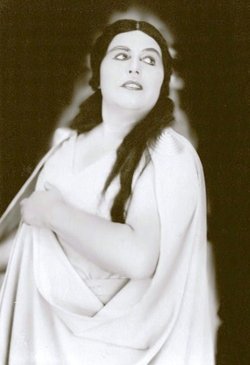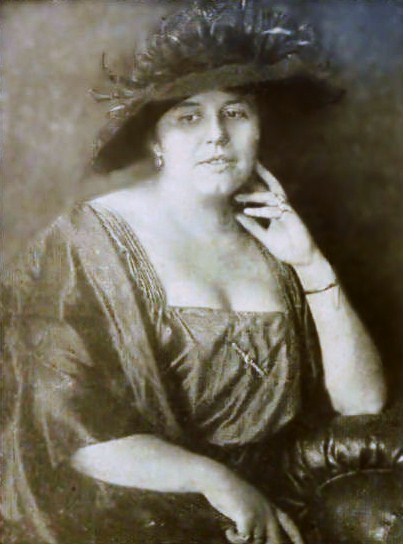Opera Singer. A powerful German dramatic soprano, noted for her Wagner interpretations. She was on the threshold of international fame when she died tragically at 38. Bindernagel studied singing at the conservatory in her native Magdeburg, and attended the Berlin Musikhochschule from 1911 to 1916. After graduation she made her professional debut with the Breslau Opera. During the Weimar Republic era she was a star of the Berlin State Opera, where she was engaged from 1921 to 1927 and of the Berlin Civic Opera from 1931 until her death. In the interim she toured Spain and Belgium, and scored an outstanding success in her only appearance at the Vienna State Opera, as the Marschallin in a 1930 production of Strauss's "Der Rosenkavalier". Her repertoire included Wagner's "Tannhauser" (the roles of Elisabeth and Venus), "Lohengrin" (Ortrud), "Tristan und Isolde" (Isolde), and "Siegfried" (Brunhilde), the title roles of Verdi's "Aida" and Puccini's "Tosca", as Donna Anna in Mozart's "Don Giovanni", Leonore in Beethoven's "Fidelio", Lady Macbeth in Verdi's "Macbeth", and Nedda in Leoncavallo's "Pagliacci". She was also comfortable with modern fare, playing the comic villainess Fata Morgana in Prokofiev's "The Love for Three Oranges", and in operas by Schreker and Wellesz. Bindernagel was married twice. In late October 1932, her estranged second husband, banker Wilhelm Hintze, shot the singer at the Berlin Opera House as she was leaving after a performance in "Siegfried". She lingered in a hospital for several days before dying from her wounds. At the trial Hintze claimed that his wife and her lover were conspiring to ruin him financially; in fact there was neither a lover or a conspiracy. Hintze served 12 years in prison for the murder. After World War II the lease on Bindernagel's grave at Berlin's Waldfriedhof Heerstrasse was allowed to expire, and the site was recycled according to German custom. Her small recorded legacy - 11 arias and solos, only one of them by Wagner - is available on CD.
Opera Singer. A powerful German dramatic soprano, noted for her Wagner interpretations. She was on the threshold of international fame when she died tragically at 38. Bindernagel studied singing at the conservatory in her native Magdeburg, and attended the Berlin Musikhochschule from 1911 to 1916. After graduation she made her professional debut with the Breslau Opera. During the Weimar Republic era she was a star of the Berlin State Opera, where she was engaged from 1921 to 1927 and of the Berlin Civic Opera from 1931 until her death. In the interim she toured Spain and Belgium, and scored an outstanding success in her only appearance at the Vienna State Opera, as the Marschallin in a 1930 production of Strauss's "Der Rosenkavalier". Her repertoire included Wagner's "Tannhauser" (the roles of Elisabeth and Venus), "Lohengrin" (Ortrud), "Tristan und Isolde" (Isolde), and "Siegfried" (Brunhilde), the title roles of Verdi's "Aida" and Puccini's "Tosca", as Donna Anna in Mozart's "Don Giovanni", Leonore in Beethoven's "Fidelio", Lady Macbeth in Verdi's "Macbeth", and Nedda in Leoncavallo's "Pagliacci". She was also comfortable with modern fare, playing the comic villainess Fata Morgana in Prokofiev's "The Love for Three Oranges", and in operas by Schreker and Wellesz. Bindernagel was married twice. In late October 1932, her estranged second husband, banker Wilhelm Hintze, shot the singer at the Berlin Opera House as she was leaving after a performance in "Siegfried". She lingered in a hospital for several days before dying from her wounds. At the trial Hintze claimed that his wife and her lover were conspiring to ruin him financially; in fact there was neither a lover or a conspiracy. Hintze served 12 years in prison for the murder. After World War II the lease on Bindernagel's grave at Berlin's Waldfriedhof Heerstrasse was allowed to expire, and the site was recycled according to German custom. Her small recorded legacy - 11 arias and solos, only one of them by Wagner - is available on CD.
Bio by: Bobb Edwards
Gravesite Details
Gravesite no longer exists
Advertisement
See more Bindernagel memorials in:
Records on Ancestry
Advertisement






